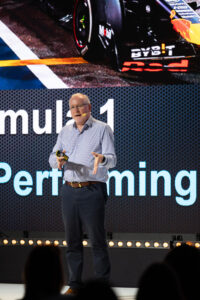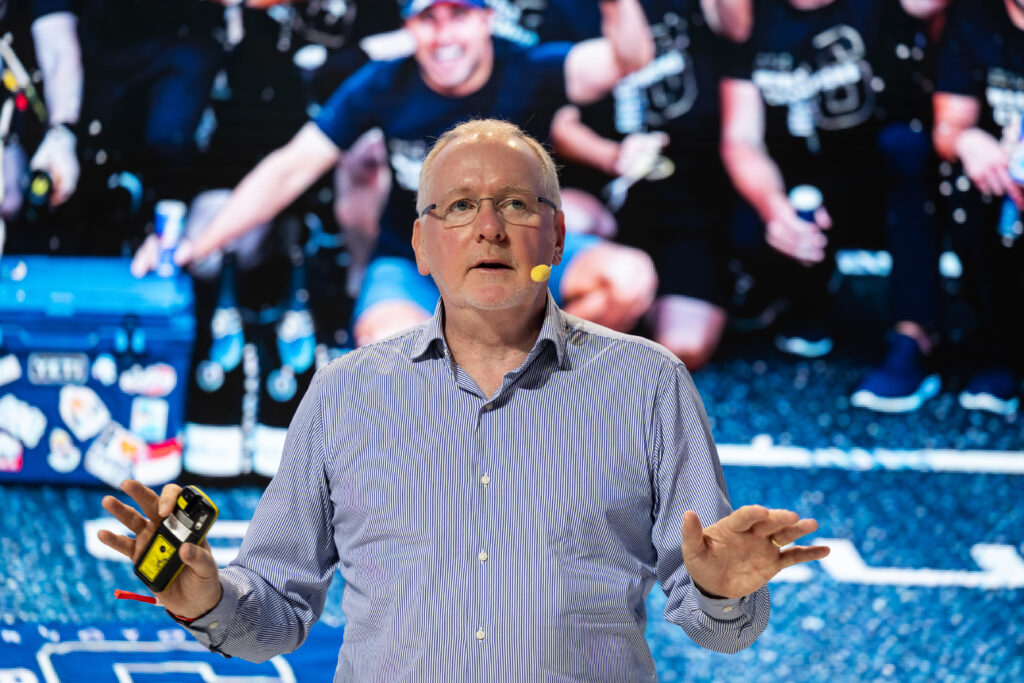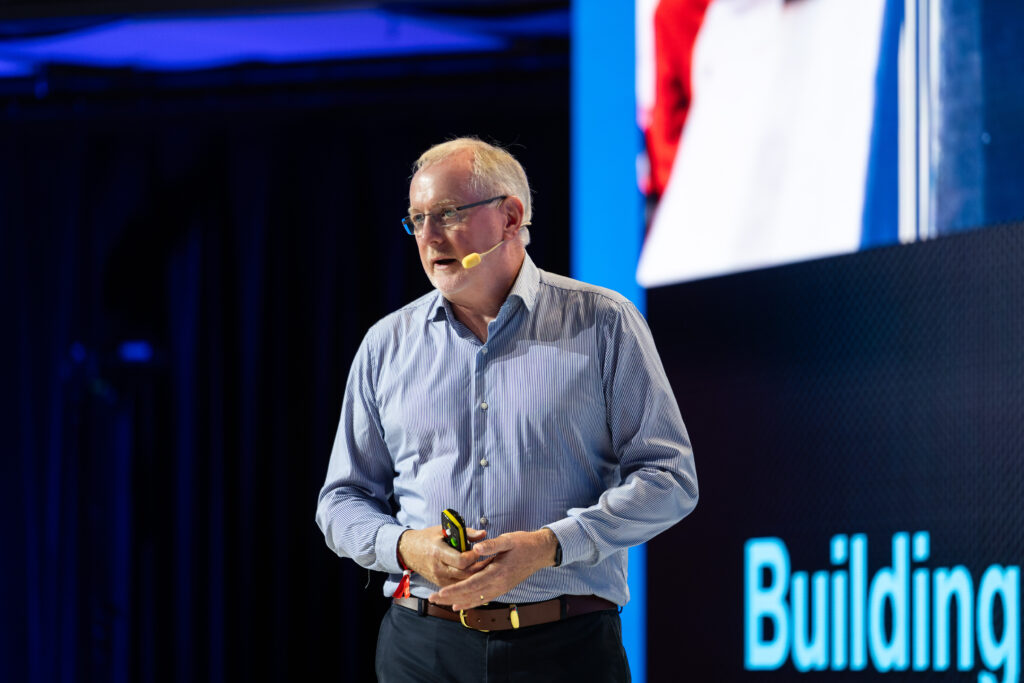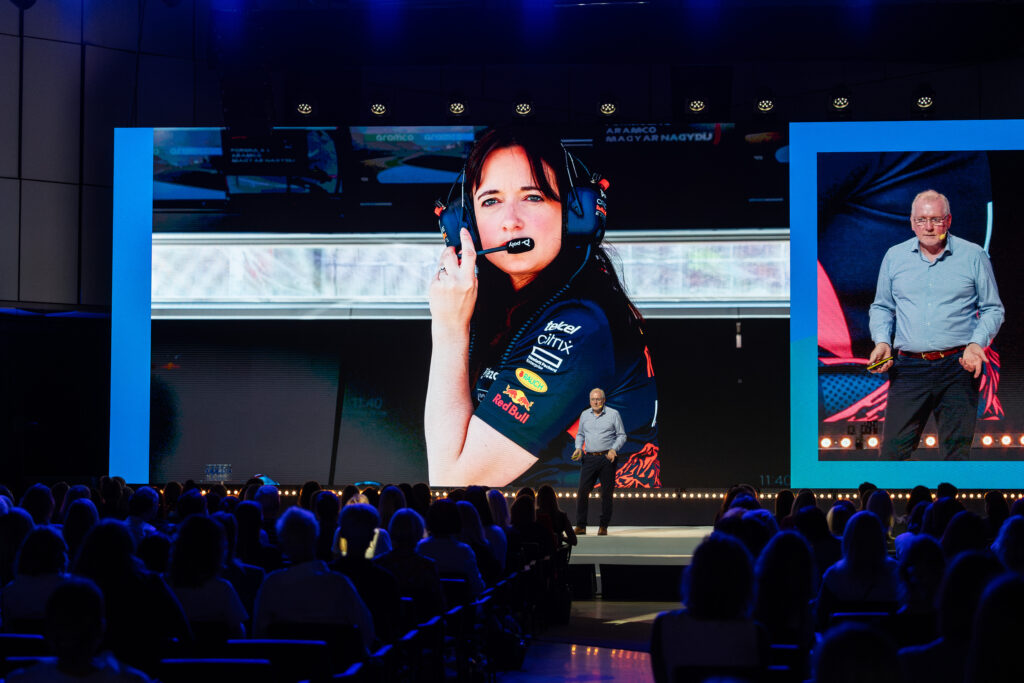The Human Engine of Formula 1: An Interview with Mark Gallagher
The roar of engines, the flash of speed, the gleaming machinery – Formula 1 is all about glamour, cutting-edge technology, and intense competition, right? But what really drives success behind that high-octane spectacle? We recently sat down with Mark Gallagher, a true veteran with 41 years in Formula 1, to uncover the surprising truth about what makes a high-performance team tick. He shared some fantastic insights from his incredible journey, including his time with the formidable Red Bull Racing.
 People Power: The Unsung Heroes of F1
People Power: The Unsung Heroes of F1
Mark, thanks so much for joining us! After over four decades in Formula 1, a sport that seems utterly dominated by tech, what’s the single biggest lesson you’ve picked up about leadership?
Oh, it’s absolutely clear, without a doubt: the most important asset in any business is its people. It boils down to how they’re led, how they’re inspired, how they’re looked after, coached, and mentored to have an amazing career and life. As leaders, we hold that incredible opportunity in our hands. So, while I love talking about the cars, today’s chat is really all about the people and what I’ve learned about building and working with those high-performing teams to create something truly special.
Red Bull Racing, for instance, is a huge operation. You mentioned they have 1,500 full-time staff. How do all these folks contribute, and is the driver really the most crucial person on the team?
(Laughs) That’s a common one! We’ve got 1,500 people working in our factories, designing, manufacturing, and developing the car – the product – that then competes all over the world. And while the driver has one absolutely critical job on race day, there are 1,499 other jobs that need doing! Seriously, everyone is important, equally important.
Our secret to building these high-performing teams starts with finding the best people. Academic qualifications are handy, but what we really prioritize is finding individuals with the right mindset and mentality. Those are the folks who really shine in a team environment, who understand they need to contribute fully, and who are eager to come along on this journey with us. It’s about empowering them to be their absolute best.
And here’s a cool fact: over 90% of our employees actually work in the factory, Monday to Friday, just like anyone else. The real magic of leadership comes from bringing everyone together, making the people in the factory feel just as inspired as those who get to travel the world, and recognizing every single contribution.
Formula 1 has such a relentless, clear-cut calendar. How do those “non-negotiable deadlines” fire up your team’s drive and performance?
Well, we have 24 non-negotiable deadlines throughout the year – those 24 Sunday afternoon races. You can’t just show up in Bahrain on Monday, March 3rd, with the best car in the world if the race was on Sunday, right? This creates an incredible sense of urgency within our team. It’s all about hitting those deadlines, staying on track with the project, and understanding why everyone needs to roll up their sleeves to achieve our ambitious goals: not just meeting the deadlines, but also absolutely crushing the competition!
We’re also completely obsessed with continuous improvement. We’re not just building a brand-new car every year; we’re constantly developing it over those 24 races, making it faster, more reliable, higher quality, and super safe. We use that project plan to motivate our people, to constantly ask ourselves: “How can we do even better, every single day, every week, every month, every year?”
Culture, Vision, and Nurturing Talent
Red Bull has really dominated Formula 1 lately, even against automotive giants like Mercedes-Benz and Ferrari. Considering there’s a budget cap in F1, what’s their secret ingredient? Do they just have endless money or a bigger factory?
(Smiling) Oh, no, not at all! We all operate under the exact same financial budget. The thing that Red Bull has developed, and what I truly want everyone to think about, is their culture. They’ve built a team culture of innovation, creativity, and high performance. It’s about encouraging every single staff member to contribute, to challenge the big players, to be curious, and to constantly ask, “How can we do things differently?”
If you visited the Red Bull factory, you’d see 1,500 people all working together to design and manufacture thousands of pieces of mechanical, aerospace, automotive, and digital technology. They’re all picked for their amazing capabilities, and then they’re empowered to deliver the performance we want from each and every one of them. That, right there, has been the key to Red Bull’s incredible success over the last 15 years.

You had the privilege of working with Dietrich Mateschitz, the founder of Red Bull. Can you share a story about his leadership style and how it really shaped the team’s culture?
When Dietrich decided to buy a Formula 1 team back in 2004, he actually acquired the Jaguar Formula One team from Ford for a dollar! He inherited three factories, 600 very unhappy staff – remember, the team had been totally unsuccessful, despite a billion dollars spent, and Ford was just going to close it down and make everyone redundant.
So, in his very first week, Dietrich came to England and stood in front of those 600 employees. He said, “Good morning. My name’s Dietrich. You now work for me. In fact, you now work for Red Bull.” You can just imagine the silence in the room! But then he spent 30 minutes talking to them. He said, “The reason I’ve bought this business is because of you. You are a talented group of people. There is so much capability in this room.”
He shared his vision: “My vision as a leader is to give all of you the opportunity as a team to become world champions, and we’re going to do that together. I need you to tell me what you need, and I will tell you what my vision is.” He even set an ambitious goal: to be world champions in five years. Some folks probably thought he’d had way too much Red Bull! But then, he asked every employee to go home, write down why the business wasn’t delivering, to be honest, and tell him the truth, promising no one would get into trouble.
From day one, Dietrich was introducing psychological safety, telling people, “Speak up, speak out. Tell me what you want. Tell me what you need. My job as a leader is to provide the environment where you can all truly thrive.”
And the amazing part? Five years later, Red Bull started dominating, winning championships from 2010 to 2013, and they’re back at the top now. It all stemmed from that visionary leader and the incredible empowerment he fostered among the workforce – encouraging them to problem-solve together and to avoid pointing fingers when things went wrong.
Red Bull is also famous for bringing up young talent, like Max Verstappen, who they signed when he was just 14. How does that fit into their philosophy?
Max is a perfect example of Red Bull’s approach: finding and developing the best talent, reaching out to young people, even school children and undergraduates. Max was a phenomenal go-kart racer and incredibly good at online gaming. Red Bull signed him at just 14 years old! He spent three years training in a simulator, and when he entered Formula 1 at 17, he hadn’t even passed his driving test yet! He went on to become the youngest winner in Formula 1 history.
When the media asked Max how he became so successful so young, he always said, “It’s because I work for the best team in Formula 1. They’ve trained me, they give me all the support necessary.”
And here’s the thing: when Max is racing, he’s never on his own. His car sends about two terabytes of real-time data back to the leadership team, who are supported by data analysts trackside, and all the way back to our headquarters in England. Decisions aren’t made by Max alone in the cockpit; they’re made by the team back at HQ. The delay in data transmission from, say, Singapore to England, is only about 11 milliseconds on average. It really shows how we use our networks to connect the entire team. Everyone is working together, the entire organization is supporting him. We’re all about supporting our people, making sure they feel supported, coached, and mentored.
That leads us beautifully into the topic of diversity within these high-performance teams. Can you give us an example of how that plays out?
Absolutely. The person making the key strategic decisions back in the factory, running the whole program, is Hannah Schmitz. She’s 32, a data scientist, and get this – she didn’t even know Formula 1 existed 15 years ago! She joined through an internship program, then as a data engineer after her master’s. And now? She’s the principal strategist for the team.
When I started 40 years ago, F1 was very much a “man’s sport,” and everyone was European. Today, if you come to an F1 event, you’ll find women working in every single part of our business, and we have the best people from all over the world. Our diversity and inclusion, and our drive to build high-performance teams, has benefited enormously from this. We’re talking gender diversity, cultural diversity, diversity of thought – people bringing their brilliant ideas into our organization. We want folks like Hannah to bring their amazing capabilities to help us win, consistently.

Lessons from the Track: Trust, Recognition, and Unexpected Heroes
How do you keep the team unified and everyone feeling engaged? You mentioned some cool recognition programs.
One fantastic example is the recognition program that Red Bull and Mercedes introduced, where anyone in the team can be selected to represent the team on the podium when we win a Grand Prix. It’s such a powerful way to give the entire organization the chance to be recognized, and for individuals to feel celebrated for their contribution.
I recall a podcast with a young woman named Holly, who works for Mercedes. She was 19 when she started watching F1 with her stepfather, and she was studying engineering. He suggested she apply for internships, and she ended up getting one at Mercedes. Fast forward six years, and she’s now the senior engineer on Lewis Hamilton’s engine!
After they won a Grand Prix, the chief executive walked up to her, tapped her on the shoulder, and said, “Holly, you’re on the podium today!” She absolutely couldn’t believe it. Five minutes later, she’s walking up the steps, Lewis Hamilton has grabbed her, she’s out on the podium in front of 200,000 fans and 150 million people watching on TV. Then someone hands her a magnum of champagne and asks her to spray it! She’d never even opened a bottle of champagne before. So, Lewis Hamilton literally coached her on how to do it! She told me, “Mark, when I got back to my desk, my phone had just lit up!” She had 400 messages, including from her mom and stepfather, who saw her on TV and knew their little suggestion had led to that incredible moment.
When I asked her what that did for her career, she said, “Mark, it just made me realize I work for the best company in the world. They genuinely recognize the job I do.” It truly empowers people and gives them the best possible opportunity to succeed. This is what I learned from working with the best in the business. People like Lewis Hamilton and Michael Schumacher would always tell you, they were champions because they had an amazing team around them.
Let’s talk about the mind-blowing efficiency of a Formula 1 pit stop – 22 people servicing a car in just two seconds. What’s the secret to that level of teamwork?
A pit stop is kind of like our version of customer service, and the goal is to service the car in a mind-boggling two seconds. These are 22 ordinary employees from whom we expect something truly extraordinary. I was chatting with a member of the Red Bull pit crew, and he told me, “Mark, it really comes down to me and to them. Each one of us is doing the best job possible. We trust and respect each other. We are each contributing fully. And when we all do our job to the best of our ability, that’s when the magic really starts to happen.”
He made a really important point too: when something does go wrong, we support each other; we don’t play the blame game. That’s a common ingredient in these high-performance teams: they actively get rid of negative cultures and blame. Everyone makes mistakes!
I’ll never forget Lewis Hamilton coming in for a pit stop in Malaysia a few years back and accidentally pulling into the McLaren pit box instead of Mercedes! It was so embarrassing and very public, and it cost the team a victory. But on the Tuesday morning after that race, Lewis went to the factory and apologized to all the employees. And everyone said, “No, Lewis, you do an amazing job. You just had a bad day. We will help you make sure that never happens again.” At the very next race, they even had a guy in a high-visibility jacket standing there, just guiding him in!
The world record for a pit stop is an astonishing 1.82 seconds, set by Red Bull in 2019. That’s 22 ordinary men and women doing something absolutely extraordinary because they’ve been given the opportunity, the system, and the process to deliver it safely, reliably, repeatedly, and with incredible performance.
You have a famous story about a bus driver and a French Grand Prix. Can you share that with us?
Oh, that’s one of my favorites! We were at the French Grand Prix, and the weather was totally unpredictable. We had Ferrari with helicopters, McLaren with satellite weather data, and us at Jordan, well, we were getting our forecast by fax machine, which simply told us the weather was “changeable”!
Our bus driver, Dave, who had been with us for seven years, came into our strategy meeting bringing coffee. He actually interrupted us and said, “You know, I might have an idea here. I could become your human early warning system. I can hop on my scooter, drive down the road in the direction the weather’s coming from, and if it starts to rain, I’ll radio you.” Of course, we initially just laughed and told him to stick to the coffee.
But then, during the race, when Heinz, our driver, was in fifth place, Dave’s voice crackled over the radio: “Hello, can anyone hear me? It’s starting to rain. You need to make a pit stop for wet weather tires!” We tried to shunt him to another channel, telling him to talk to HR on Monday. But it did start to rain!
Then Dave came back on the radio again. He said, “You don’t want to talk to me, but I’ve got to tell you something. This isn’t just a shower; it’s a weather front. It’s going to keep raining all day. You need to fill the car with fuel and just finish the race on wet weather tires.” And then came the weirdest radio communication of my F1 career: our chief technology officer, who had a PhD in aeronautical engineering, asked Dave, our bus driver, “What makes you such an expert on rain?” Dave simply replied, “I’m from Scotland.”
And believe it or not, our chief technology officer took that information on board, turned to the team, and said, “Do exactly what Dave said.” We filled the car with fuel. Heinz immediately radioed us, “How much fuel did you put in my car?!” We told him a hundred kilos, making the car super heavy. Our CTO just said, “Well, Heinz, we’ve been analyzing all the data, just keep driving.” He didn’t want to say, “Listen, Heinz, I’ve been chatting to Dave!” Anyway, he kept driving, and half an hour later the rain was even worse. The two Ferraris, running first and second, had to make a second pit stop for fuel, and we jumped from fifth to third. Then, 10 minutes before the end of the race, the two McLaren Mercedes cars were running out of fuel and had to make another pit stop. And we won the French Grand Prix!
I’m sharing that with you because we learned more that day about people, leadership, and teams, and high performance, than probably any other day in my career. We had an incredible party, and in the middle of it, this soaking wet guy walks in – it was Dave! No one had even radioed him back to tell him what happened. He asked, “What happened?” We said, “Well, we won the race. Actually, you won the race.” And Heinz even presented the trophy to Dave, saying, “You won that race for me today.”
So, what were the big takeaways from that experience for your management team?
In our management meeting, we talked about all we’d just learned: the immense importance of listening to your own people, no matter what their qualifications are. If they love working for you, they will contribute. We reflected on why we initially dismissed Dave’s idea and why we finally listened – because our chief technical officer knew Dave loved the company and was brilliant at his job. And, crucially, we realized that when we won, we completely forgot him; the recognition simply wasn’t there.
You truly learn from experiences in leadership, in life, and in business. That day was the one that taught me the most about people, about high performance, and about giving everyone the very best chance to be the best they can be in the world.
Mark, what an insightful and frankly, inspiring, discussion. It really drives home that while technology and strategy are certainly important, the human element is truly the ultimate differentiator in achieving extraordinary results. Thank you so much for your time.
My pleasure, thank you!

